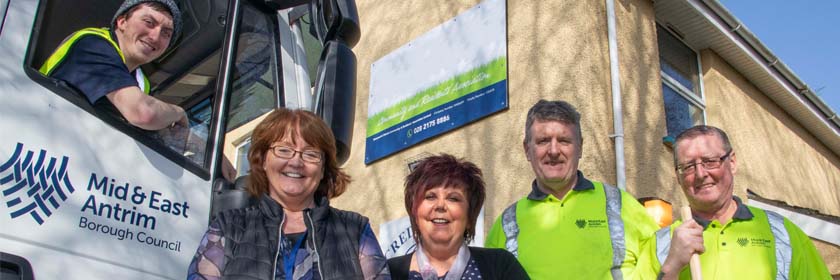Emergency Planning

We aim to ensure that local residents have the information they need to be prepared for emergency situations.
Follow the links below for more information.
Guidance and newsletters
A range of booklets has been produced to help you be prepared.
We recommend you read these and adapt the plans for your own home.
- Download the Household Severe Weather Plan from the NIDirect government services website
- Download the HELP - Household Emergency Life-Saving Plan from the NIDirect government services website
- Download the Household Flood Plan from the NIDirect government services website
- Download the Getting Weather Ready – the Regional Community Resilience Group Newsletter from the Department for Infrastructure's website.
Severe Weather
The Met Office National Severe Weather Warning Service (NSWWS) warns of the impacts caused by severe weather.
Met Office weather warnings include a level of impact that the forecast weather is expected to bring and the likelihood of those impacts occurring.
For details please visit the NI Direct website.
Flooding
To find out below how to prepare for flooding, how to cope during flooding and what to do after flooding has occurred, please visit the NI Direct government services website.
Scheme of Emergency Financial Assistance
Householders affected by flooding, may be eligible to receive a £1000 inconvenience payment, subject to meeting the criteria of the Department for Communities Scheme of Emergency Financial Assistance.
Please contact Environmental Health within 7 days of the incident on T: 028 2563 3394.
The Association of British Insurers (ABI) and the National Flood Forum have developed consumer advice around insurance and what to do in the aftermath of a flooding event.
Visit the ABI website to access their Responding to Floods Guide webpage providing details on what to do if you need to urgently leave your home, on managing a flood claim and some further information and contact details.
Rates Relief for properties affected by flooding
Land & Property Services (LPS) can consider the circumstances of properties impacted by flooding on a case by case basis.
For Non-Domestic properties relief may be available through Valuation processes, for Domestic properties, an exclusion may be available through rating of empty homes legislation.
Non-Domestic/Commercial Properties
- Information and an online Application Form to have a property’s valuation revised is available on the NI Business Info website.
- When Land & Property Services (LPS) receives an application a LPS Valuer will visit and assess the property to determine if the damage merits an amendment to the Net Annual Value and revision of the Valuation List entry.
- If the application does not result in an amendment to the Valuation List, ratepayers may consider applying for relief under the Hardship Rate Relief Scheme.
What is Hardship Rate Relief?
Hardship Rate Relief for non-domestic rates is aimed at providing rate relief to assist a business in its recovery from a temporary crisis resulting from an exceptional circumstance.
Information and how to apply for the Hardship Rate Relief Scheme is available on the NI Business Info website.
Domestic Properties
For homeowners affected by flooding, assistance may be available through a Rating of Empty Homes exclusion.
You can apply for an exclusion from rates if:
- You qualified for compensation from the local Council because your home flooded after heavy rain or a tidal surge.
- Your property was unoccupied continuously for at least four weeks.
- Your property was your main home before the flooding.
You could get this exclusion from rates for up to six months.
Further information on the Rating of Empty Homes can be located on the NIDirect government services website.
Please note the exclusion from rates under the Rating of Empty Homes can only be applicable where the owner of the property has qualified for compensation from their District Council after severe flooding by virtue of a scheme made under Article 26 of the Local Government (Miscellaneous Provisions) (Northern Ireland) Order 1992.
Further information about what to do if flood happens can be located on the NIDirect government services website.
Other Emergencies
There are many emergency situations that you may come across.
Find out more information on the NI Direct government services website.
This page cannot cover all eventualities.
Resilient Communities
How can your community become more prepared for emergency situations?
Where an area has a high risk of flooding or severe weather a Community Resilience Group can make a big difference in a community being prepared.
In Ahoghill, Broughshane and Toome Road Ballymena Community Resilience Groups have been working with all the different agencies to reduce the likelihood and impact of flooding.
If you are interested in volunteering in your local community, or if your school or community group wants to hear about what to do in an emergency please get in touch by E: Juliet.Coulter@midandeastantrim.gov.uk or E: Anne.Hardy@midandeastantrim.gov.uk.
Emergency Helplines
| Emergency Helplines | |
|---|---|
| Housing Executive 03448 920 901 |
Northern Ireland Water Waterline 03457 44 00 88 (Customer Hotline) |
| Northern Ireland Electricity Networks 03457 643 643 (Customer Hotline) |
Flooding Incident Line 0300 2000 100 |
| Transport NI 028 7035 3202 (24 hours - including snow/ice) |
Gas Smell / Emergency |
If there is an emergency
- Stay calm, reassure others and think before acting
- Don’t put yourself or others in danger
- If people are injured or there is risk to life call 999
- Follow the advice of the emergency services